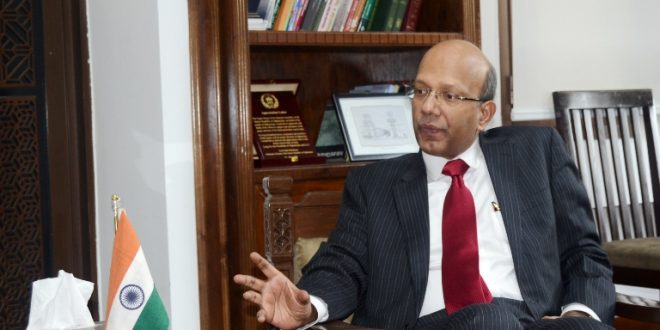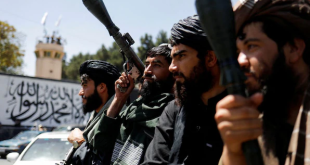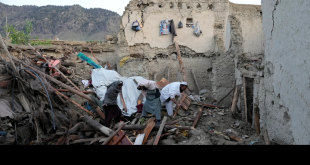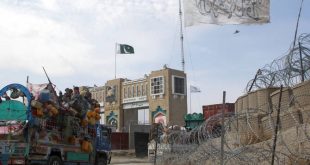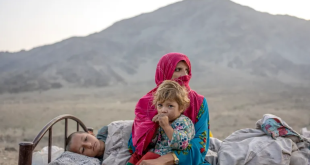India’s outgoing ambassador lambasts Pakistan’s intelligence agencies for stoking the fire in Afghanistan, arguing that peace won’t materialize without dismantling terrorist infrastructure outside Afghanistan
By Seddiq Hussainy
KABUL: Ambassador Vinay Kumar of India reaffirms India’s steadfast and unflinching support for a democratic and republic Afghanistan in its pursuit of stability and prosperity at a time as Afghanistan government and Taliban militants have embarked on a journey to reach a settlement to end the grilling conflict. Ambassador Kumar blames Pakistan’s intelligence agencies for stoking the fire in Afghanistan by supporting terrorist organizations. He holds a strong belief that unless terrorists’ infrastructure and support outside of Afghanistan is dismantled, an enduring peace will not materialize.
Afghanistan Times has spoken with Ambassador Vinay Kumar about a range of hot-button issues presented here:
How do you see upcoming peace talks? Do you think negotiations will culminate in peace and stability in Afghanistan?
Vinay Kumar: India has had a longstanding policy of supporting an Afghan-led and Afghan-owned peace process anchored on dismantling of terrorist infrastructure – in which Afghans and political groups can find a compromise in governance, power-sharing and nation-building. We have observed for more than four decades that the origins, support and infrastructure of terrorism is located outside Afghanistan’s borders. Unless that is not resolved, we are very apprehensive that we can’t achieve an enduring peace. As peace talks are still unfolding, India hopes there is genuine willingness for a negotiated political settlement. Moreover, preservation of Afghanistan’s gains in the past 19 years is necessary, which requires all segments of society to come together on a common political platform. That, I repeat, hinges on an end to violence and terrorist bases overseas. That can be pursued when environment is free from violence without big walls and barbed wires. India would always stand with Afghanistan in its pursuit of national peace, stability and prosperity. Without peace, we can’t have stability and at this stage, democratic and republican forces of Afghanistan will have work together to preserve the gains of past decades.
As a guardian of democracy, India has long supported elections in Afghanistan; are elections at stake in the dialogue with Taliban?

Vinay Kumar: India has garnered the experience that democratic elections is the best way and most effective and enduring method to elect and change a government. Any other method is either violent or disruptive. With almost seven decades of experience in elections and almost a billion voters and a functional technology behind it, India stands ready to share its experience with Afghan partners. We will look on for the result of intra-Afghan talks.
How, do you think, Chabahar port will benefit India and Afghanistan? What are problems facing the strategic port?
Vinay Kumar: We have had difficulties of trade and transit, which have been partly resolved through operationalization of Chabahar port and the mechanism of air corridor. Chabahar port is very important trade and transit point for Afghanistan to reach out to Indian markets and beyond. It further connect us to Central Asia through Iran. India also built a highway in Nimroz to facilitate trade from Chabahar to Afghanistan. Most of Afghan-India trade passes through that port and over 800,000 tons of India’s cargoes came through it. Afghanistan also sends fresh fruits to India through Chabahar. We also have a comprehensive plan to integrate the port and connect Afghanistan with India and the region. Over the last 3 years, India-Afghanistan trade volume has consistently risen and amounted to over $1 billion. In 2017, trade increased nearly by 30% year on year and 15% in 2018 and 2019. About commodities being traded, I have to say that Afghanistan exports fruits, dried fruits, saffron and marble, while India exports pharmaceuticals, medical equipment, textiles and construction materials to Afghanistan.
India has been a generous ally, recently pledging $1 million to help Afghanistan preserve its historic heritage. How would you describe post-peace Indo-Afghan relationship?
Vinay Kumar: Cultural and civilizational ties between India and Afghanistan are very entrenched. In 1970s, India was actively involved in preservation of Bamyan Buddha statues. More recently, India renovated Bagh-e-Babur garden and Bala Hisar fortress is being rebuilt with Indian assistance. India will continue to undertake projects to excavate, preserve and renovate Afghanistan’s centuries-old cultural heritages. We will remain committed to broadening and deepening economic ties with all countries in the region, Afghanistan in particular. India is the largest export market for Afghanistan products with which Afghanistan has trade surplus. India has contributed immensely for socioeconomic development, reconstruction, irrigation, and power generation, education, training and capacity-building. Spanning all over Afghanistan, 400 India-funded projects have been implemented including the building of the Afghan Parliament and the Salma Dam, not to mention 25,000 education scholarships. India stays committed to helping Afghanistan.
About the horrendous and deadly Gurdwara attack; reports show an India’s National Investigation Agency team is in Kabul to probe the incident. What could you tell us about the investigation?
Vinay Kumar: Let me reiterate that infrastructure of terrorism in Afghanistan is located outside its borders. The NIA investigation is not over yet. We will make sure everybody will know once the result is found out.
Sadly, India has surged to second place in Covid-19 cases worldwide. What is happening?
Vinay Kumar: This is a pandemic that has inflicted the entire world. As far as India is concerned, the government has focused on containing the virus, preparing the necessary infrastructure, and increasing public awareness about the pandemic including social distancing, in order to cope better with its rising threat. But, coronavirus cases are inconsequential compared to India’s population. Moreover, India has the highest rate of recoveries, with more than 70% of infected people recovering, and the world’s lowest death rate, with roughly 1.5% fatalities compared to 5% globally. This is all thanks to Indian government’s preparedness, modern health facilities and sufficient ventilators in hospitals. India is also working on a vaccine. And Afghanistan will be a priority to be provided a clinically-approved vaccine.
Hezb-i-Islami leader Gulbuddin Hekmatyar has recently hinted that India is supporting the rise of militia groups in Afghanistan. That statement is probably driven by his sympathy for Pakistan’s cause. What is your position on this?
Vinay Kumar: India’s foreign policy towards Afghanistan is very clear. India’s relations are exclusively and solely with the government of Afghanistan. We have long pursued a state-to-state relationship. India has consistently supported the Afghan state and its cooperation will continue in that course.
Bidding farewell to Afghanistan, how would you remember your mission?
Vinay Kumar: This is the destiny in a diplomatic life to start a mission in a country and then leave. Afghanistan has been one of the most memorable experiences of my life. I had the privilege of being bestowed with so much love all over Afghanistan. There is so much passion and love for India, Indian culture and Bollywood. The experience of Afghan youth is a big source of strength and a big reason for optimism for Afghan friends like me. I will go out of Afghanistan but I don’t think Afghanistan will ever go out of me.
Thanks you Mr. Ambassador
It is a pleasure.
 Afghanistan Times
Afghanistan Times
